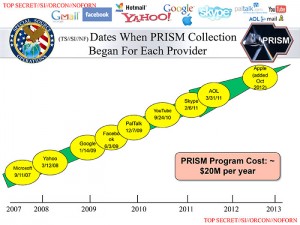 In the wake of the amazing stories from The Guardian and the Washington Post on the expansion of NSA surveillance, I’ve been tweeting links to stories and websites on the contractors who help the world’s largest spying agency analyze all the data (and megadata) it obtains from phone and Internet companies.
In the wake of the amazing stories from The Guardian and the Washington Post on the expansion of NSA surveillance, I’ve been tweeting links to stories and websites on the contractors who help the world’s largest spying agency analyze all the data (and megadata) it obtains from phone and Internet companies.
Here’s a profile of one of those companies: Palantir Technologies Inc., a company initially funded by the CIA that has become one of the hottest players in U.S. intelligence, in the wars in Iraq and Afghanistan, and most likely at the NSA.
Palantir sells a powerful line of data-mining and analysis software that maps out human social networks for counter-intelligence purposes, and is in huge demand throughout government and in the financial and banking industries. Its customers includes the CIA, the FBI, the U.S. Special Operations Command, the Army, Marines and Air Force, as well as the police departments of New York and Los Angeles.
The NSA, which intercepts and analyzes global communications traffic, is a highly likely client as well. It was “eyeing” Palantir in 2009, according to the Wall Street Journal. One laudatory media profile called it “the darling of the intelligence and law enforcement communities.”
And on June 7, the DC publication TPM published this letter from a reader who noticed this tantalizing overview of a Palantir program called PRISM that’s used by intelligence agencies. PRISM, of course, is the name for the massive Internet-mining program being used by the NSA and exposed in The Guardian. “Is this who runs PRISM?” the reader asks. Good question; somebody does.
Palantir, in fact, is in the forefront of surveillance technology, and may have provided some of the very technology that the government used to track and find the Boston bombers. Its software is probably being used by the FBI and other agencies in the deepening investigation into their past and potential foreign connections in Chechnya and elsewhere.
And you can imagine how useful it would be to NSA analysts trying to make sense of all the telephone and internet data downloaded from Verizon and nine Internet companies that was described in the latest blockbuster stories in The Guardian and the Post.
“Their bread and butter is mapping disparate networks in real time,” a former military intelligence officer who has used Palantir software told me. “It creates a spatial understanding that can be easily used by analysts.” The former officer, who’s now a contractor himself, half-jokingly called Palantir “an innovative company marketing innovative solutions to the least innovative parts of the federal government.”
Palantir, which is based in Silicon Valley, was founded in 2003 by Alex Karp, a global investor, and Peter Thiel, the founder of PayPal. The online payment company had created software to uncover financial fraud, and Karp and Thiel wanted to use it to fight cybercrime and terrorism.
In 2005, In-Q-Tel, the CIA’s venture capital fund, invested about $2 million in the company, and CIA officials began introducing Palantir to other intelligence agencies and the Pentagon. It is currently valued at around $8 billion, according to Karp.
“Palantir was developed to address the most complex information analysis and security challenges faced by the U.S. intelligence, military, and law enforcement communities,” In-Q-Tel says on its website. The “Palantir platform,” it adds, “uniquely leverages [the] innate human ability” to identify patterns in information “with advanced computational power to accelerate the analysis of data at massive scale.”
C4ISR Journal, a specialty publication on defense technologies, explainsthat Palantir now uses these programs to work “with defense and intelligence agencies to merge signals intelligence, imagery, message traffic and other documents in a database that analysts can use to search for information.”
A detailed profile in the Wall Street Journal described how Palantir “tags, or categorizes, every bit of data separately, whether it be a first name, a last name or a phone number,” thus allowing analysts to “quickly tag information themselves as it arrives in the form of field reports from spies overseas, and to see who else in the agency is doing similar research so they can share their findings.”
Palantir has been particularly useful in tracking terrorist and insurgent networks in Iraq, Afghanistan and elsewhere that build improvised explosive devices (IEDs), which would make it ideal to track the Tsarnaev brothers’ network in Boston.
And it so happens that one of Palantir’s top executives, Michael Leiter, is an “analyst” for NBC News as well as MSNBC.
Leiter, who started at NBC last fall, is the former director of the National Counter Terrorism Center, the inter-agency situation room in Northern Virginia where the U.S. government synchronizes all of its intelligence analysis. As I pointed out in a recent article in Salon, he is almost always introduced in connection with the NCTC rather than as someone affiliated with Palantir. This is misleading, to say the least.
But his appearances help his company. Consider Leiter’s April 15 interview on MSNBC with Rachel Maddow (who was the only NBC host to introduce him as a Palantir executive). She had just asked him how the investigation by the FBI, the Joint Terrorism Task Force and federal and state security agencies in Massachusetts might proceed.
“Everyone in the federal government will coordinate with the FBI, but they`ll be looking overseas,” he said, according to an NBC transcript. “They`ll be looking domestically. They`ll be looking at signals intelligence and telephone communications, all trying to piece together to see things they had that were previously innocent or new information about people who might be talking about this attack.” U.S. officials, he added, will add “videotape from the scene [and] license plates of cars that were in the area. All of this enormous data will be used to combine a more holistic picture. I expect in the coming days, we`ll have a better sense of who is behind this.”
One night during the chase for the bombers, on NBC Nightly News, Brian Williams (again introducing Leiter as the “former director” of the CTC), noted that investigators had found “some of the needles” in the haystack, including the bombers’ backpacks, wires and a battery. All of that, plus imagery – “tons of it” – must be a “big early help,” he commented. Leiter replied that “all of that imagery from the store, from the police and from people, you combine that with the forensic evidence and then the secret intelligence that we are not hearing about from human intelligence sources, cell phone records, things like that. And that starts to paint the mosaic from which they can find their suspect.”
Now all of that is undoubtedly very informative to viewers. But it’s also exactly the kind of work Palantir does for intelligence agencies – and is probably doing right now for the NSA. But Palantir isn’t just sitting around, waiting for contracts; it’s also beating the bushes on Capitol Hill and on K Street. It has spent nearly $1 million lobbying for in Washington in the last two years, as these documents show.
Still, it wouldn’t be surprising to hear that Leiter’s appearances on MSNBC helped win business for his company.
As a direct result of the Tsarnaev brothers’ shocking commando-style attack in Boston, for example, federal and state law enforcement and counter-terrorism agencies are certain to intensify their drive to identify potential criminal networks in American cities and towns – a perfect job for Palantir.
The government’s focus on tracking illicit networks, such as drug smugglers and human traffickers, will be even greater with the massive spending about to flow to the U.S.-Mexican border under the new immigration bill, which includes billions of dollars for additional border security and aims to reduce by 90 percent the number of illegal crossings. That, too, could attract interest in Palantir, and the intelligence techniques Leiter describes, from border agencies like ICE and the DEA.
And then there’s the increased emphasis on protecting U.S. embassies following last September’s violent attack on the U.S. consulate and CIA headquarters in Benghazi, Libya. “If State wants to join this party, what’s the company that has the software to track them?” said the former military intelligence official who used Palantir’s software. “The more you look, Palantir has a vested interest in it.”
Yup.


